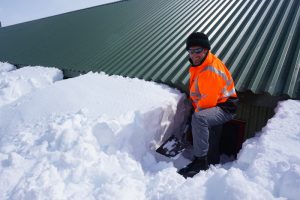
I woke up late this morning. The sun was completely gone. Not because I had slept through summer and found myself in the Austral winter, but because the snow had drifted across the window, plunging my room in to darkness. My room mate is a chef and had long gone to work. I hastened to get up. Outside the wind was still blowing a steady 50 knots (100kmph). It has been blowing hard for 2 days. Walking into the weather results my face being lashed with small ice crystals until it is painful. The blowing snow has accumulated in drifts, burying the accommodation building completely. To keep the fire escapes (our bedroom windows) clear, we have to dig them out again, but only after the wind has abated a little. In the office I help my colleague scavenge bits off old power systems. Cambridge sent some spares, but they are quickly used up. We have a fantastic set of tools and two workshops but essentials like wire have to be scavenged off old computers. Nothing is wasted here. Every last scrap is kept in case it has a possible use. Wood from pallets and packing is kept for personal carpentry projects, all other packing is kept for sending things out again. Any waste material we have is zealously recycled, an almost full-time job for the general assistants. In our department, if we want to repair things, we need to either find something as a donor for parts, or we put in an order now and wait until next year, when the ship comes again. This would leave the instrument out of order for 6 months. I am used to scavenging for parts – I started my electronics hobby when my Father suggested I recycled a TV that blew up. So this is a familiar world. Between us we get 5 power supplies of the 12 needed working. We have until Friday to get another 7 working because The Ship Is Coming. At lunchtime there is meeting explaining exactly what this will involve. It is a large merchant ship (the RSS James Clark Ross) but we have no stevedores here. Instead, the base must do all the port operations. The base crew have already got some rocks ready to moor her up to, and the vehicle drivers will be unloading the ship with the tools we have. Then all base crew will have to help manually handle the goods into the base. An operation that will be seven twelve hour long days of hard work.
I was away on Monday and Tuesday doing field training. Really this is little more than learning to put up a tent, but our field guide is an experienced mountaineer who has pioneered routes in the Himalayas, and he was happy to take us up a few neighbouring mountains. The weather was just perfect as we set off, though we knew it was forecast to change, and we took extra warm layers. The system and kit used here has little changed since Scott. This is reassuring, as it is a proven system and is also a contact with the past. Though I do find lighting a stove underneath a kerosene lamp a little worrying in this day-and-age of health and safety. On this base we are very lucky, as we have several miles of mountains to use for recreation. Despite being littered with crevasses, the field guides know the area well. It didn’t take long to get to an area on top of a large wide glacier. The view I got stretched off North to distant icebergs. Somewhere beyond those is the South Atlantic and beyond that there is home. Home seems so far away now. This is home. Home is the base I just left. They say nowhere is truely home until you have been away from it and travelled back, so I guess when I return, Rothera will have become my home.
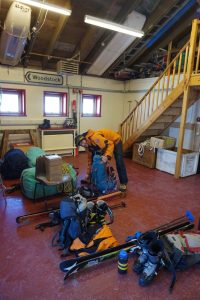
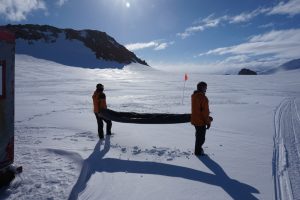
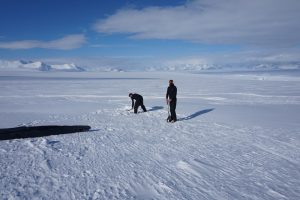
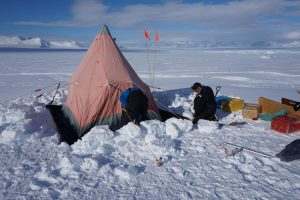
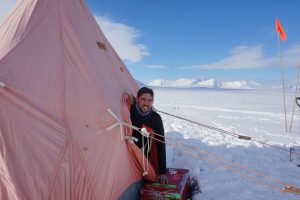
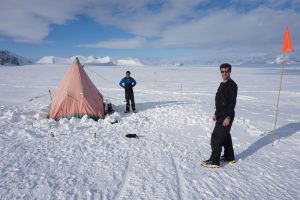
We set about putting up the tent. Fairly straightforward, except for the extra hard work of digging it into a foot of snow. My back complains loudly about this. Our field guide shows me an efficient way so the snow lifts out in neat blocks. I am learning a lot about the qualities of snow. Its stickiness, thickness, weight and curious sounds it makes. Once the tent is up, we set up the HF radio. We have a scheduled radio call with base to tell them we are OK. For the other trainee, this is the first time he has spoken on a radio, and he is a bit nervous. I recognise the base commander at the other end. The radio is very clear, which surprises me as HF is usually noisy and crackly, I guess we have better equipment than most. We have our stove and lamp set up in the tent, and we’ve been supplied with army ration packs for dinner, but we hold back on eating just yet. Despite being nearly 9pm we instead decide to for a mountain ski. Before we leave the camp ground, I take a moment to listen to the silence. That is the most surprising thing here. The silence is utter and complete. Only my breathing and the rustle of my coat are audible. If I hold my breath, I hear the blood rushing in my ears. Only an anechoic chamber or a continent of snow can create this effect. As I look around, I once again feel so lucky to be here. The last unspoilt part of our planet. There is not a single sign of human activity for hundreds of miles in any direction. Even the frozen sea shows that ships have not yet disturbed these waters. The beauty is Godly. It reminds me how our existence on this planet is so much more than our every day lives leads us to believe. I think on the futility of the every day back in the UK. I have everything I need here. There was nothing for me in the UK, except my friends and family. What would I return to?
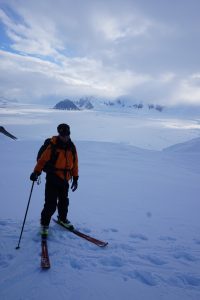
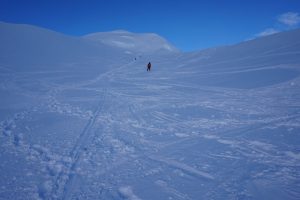
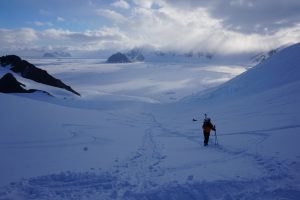
We set up off a steep slope. I have found the skins on the skis really easy to use, nothing more difficult than walking. We get to the top of a short slope, both us trainees panting for breath, but our guide is keen to go up a steeper section. We decide this is steep enough, and set up to ski back down. A few others from the base have come out to snowboard with us. Being such a beautiful evening and with the threat of being snowed in coming up, the base has made a mass exodus to the mountains. The slope we’re on sits in a glacial bowl, and ends a few hundred meters above the sea. We are cautioned to make sure we don’t go off the edge! I take the first run cautiously, stopping to admire the view south. I can see the low sun and open water out this way, where the ice is starting to break. Another breathtaking angle to take in. I could stare out at this every day, and never see it the same way twice. Shadows change as the sun moves across the sky, and the snow and ice are in constant flux. This is our own private ski resort, and as yet not a track has been made! Only the six of us are up here. Could we have it any better? I want to continually take photographs, but I know they will never capture the wide expanse in front of me. I think of my Mother who likes to paint – a far better medium to try and capture the pink light reflecting off some distant peaks right now, but alas I don’t have the skills. The sun comes out on my third and final run, and the view is lit golden, as are our faces. But it is hard work climbing up each time, and with a little regret we head back to the campsite, mainly motivated by hunger.
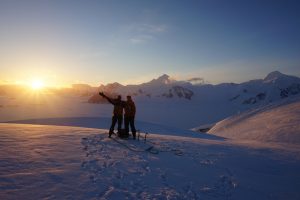
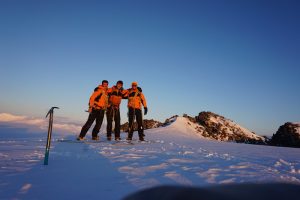
After eating the army rations, we are ready to do one more thing before bed. A spot of Alpine climbing – because of course we can! We have the kit, an excellent guide, and the best mountain range in the world to go and play on. Plus, despite being nearly midnight, it is not dark. This time we leave the skis, rope up and plod across the snow. Soon we are on the rocky area of Reptile Ridge. We take time to practice with crampons and axes. This is a fairly benign area, and I find myself enjoying getting some proper instruction. If this is how good mountaineering can be, then I could see myself getting into it. Previous attempts when I have not really known what I was doing meant I was too scared to take pleasure from it. But here I have trust in our guide, and the kit we are using seems to work really well. I can tell from the terrain that we are not in any real danger. It is just good fun, and in the white pure air, it could get better. I notice that my lungs are clearer than they have been for several years, and for that I am both relieved and thankful.
Our guide points to some distant peaks, and promises us a trip there one day. It seems a bit more technical, and I make a note to get more fit. My thighs complain a bit about the up-hill work they’ve just done.
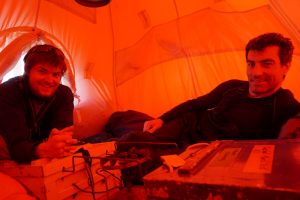
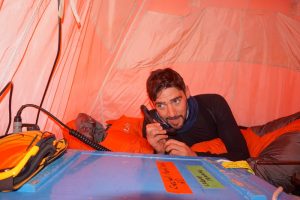
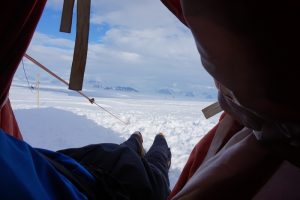
We set back to the tent, and once there get into the generous quantities of warm layers. First there is a wooden board to sleep on, then a foam mattress. On top of this is a double thick Thermarest, already twice what most mountaineers would take. Then on top of this goes a real sheep skin. Then our sleeping bags are wrapped in flame-retardant cotton (a nod to fire safety as we have the stove and paraffin lamp in the tent with us). The sleeping bag is the thickest I have ever seen, taking up four times more space than my winter sleeping bag that I’d normally use. Then finally (in case it gets a bit nippy) not one, but two sleeping bag liners. After some faffing about I choose to use just the sleeping bag. It is midsummer after all.
That night I don’t sleep very well. The light and back pain keeps me awake. Morning comes too soon. We’ve planned to leave early, to be down safe before the gales come in. But on waking the conditions are still perfectly calm and the sun continues to shine. So we go back up the mountain, this time to practice more skills: ice axe arrests, falls etc. I relish this, as having discussed the theory, I’ve never really practiced these things safely. We go through a variety of skills before finally heading back. By the time we’re coming back to Rothera, the wind is picking up. My thoughts are about the tranquility I have just experienced. I’d like to share this place with my friends, but then that would quickly become defeating. If everyone brought their friends, and their friends… it would soon be as busy as an Alpine ski resort. Still, I’d bring a few who could truely appreciate this place.
Coming down the mountain, the industrial-military build up of our tiny research stations hoves into sight. I amuse myself at this thought; that in such as short time, three huts and some antennas looks like an eyesore, after seeing only natural beauty for the last 24 hours. We descend into grey clouds and blowing snow, and pack away all the kit. The base has no shortage of the right kit, and I’ve managed to find clothes and shoes that fit me perfectly. I am really looking forward to more field trips. However, now it’s back to station life, which is already becoming routine. Not much happened while we were away, a few more fire alarms (toast, pop corn, and a defective flame detector). In the library later, I find a book where one explorer describes having had a hole left in his head by Antarctica. I know exactly what he means. Space creates space. A similar feeling can only be achieved out in the world’s great oceans.
In the bar later, I feel a bit out of sorts. The noise and business shields us from the howling winds outside. It’s easy to forget where we are when the windows are snow-covered, and we’re in a warm room with plentiful beer on supply. But I think something in me would rather be out there, on that glacier field.
This evening’s excitement was the post office opening. I have bought all my Christmas gifts, from the very limited selection. I hope they make it to the UK this year. I might be home before they are. Tonight I am in my workshop, still trying to rescue two broken laptops. This afternoon I was cursing computers once more, and life felt very “normal” again. I don’t want normal, I know I want the peace of those mountains.